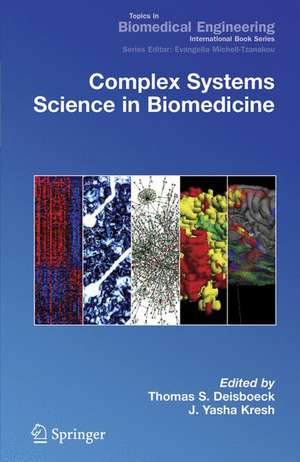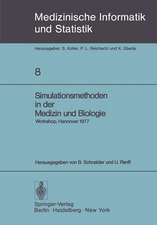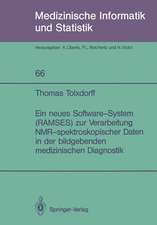Complex Systems Science in Biomedicine: Topics in Biomedical Engineering. International Book Series
Editat de Thomas Deisboeck, J. Yasha Kreshen Limba Engleză Hardback – 28 feb 2006
Thomas S. Deisboeck and J. Yasha Kresh
Complex Systems Science in Biomedicine covers the emerging field of systems science involving the application of physics, mathematics, engineering and computational methods and techniques to the study of biomedicine including nonlinear dynamics at the molecular, cellular, multi-cellular tissue, and organismic level. With all chapters helmed by leading scientists in the field, Complex Systems Science in Biomedicine's goal is to offer its audience a timely compendium of the ongoing research directed to the understanding of biological processes as whole systems instead of as isolated component parts.
In Parts I & II, Complex Systems Science in Biomedicine provides a general systems thinking perspective and presents some of the fundamental theoretical underpinnings of this rapidly emerging field. Part III then follows with a multi-scaled approach, spanning from the molecular to macroscopic level, exemplified by studying such diverse areas as molecular networks and developmental processes, the immune and nervous systems, the heart, cancer and multi-organ failure. The volume concludes with Part IV that addresses methods and techniques driven in design and development by this new understanding of biomedical science.
Key Topics Include:
• Historic Perspectives of General Systems Thinking
• Fundamental Methods and Techniques for Studying Complex Dynamical Systems
• Applications from Molecular Networks to Disease Processes
• Enabling Technologies for Exploration of Systems in the Life Sciences
Complex Systems Science in Biomedicine is essential reading for experimental, theoretical, and interdisciplinary scientists working in the biomedical research field interested in a comprehensive overview of thisrapidly emerging field.
About the Editors:
Thomas S. Deisboeck is currently Assistant Professor of Radiology at Massachusetts General Hospital and Harvard Medical School in Boston. An expert in interdisciplinary cancer modeling, Dr. Deisboeck is Director of the Complex Biosystems Modeling Laboratory which is part of the Harvard-MIT Martinos Center for Biomedical Imaging.
J. Yasha Kresh is currently Professor of Cardiothoracic Surgery and Research Director, Professor of Medicine and Director of Cardiovascular Biophysics at the Drexel University College of Medicine. An expert in dynamical systems, he holds appointments in the School of Biomedical Engineering and Health Systems, Dept. of Mechanical Engineering and Molecular Pathobiology Program. Prof. Kresh is Fellow of the American College of Cardiology, American Heart Association, Biomedical Engineering Society, American Institute for Medical and Biological Engineering.
| Toate formatele și edițiile | Preț | Express |
|---|---|---|
| Paperback (1) | 2136.03 lei 6-8 săpt. | |
| Springer Us – 23 aug 2016 | 2136.03 lei 6-8 săpt. | |
| Hardback (1) | 2140.79 lei 6-8 săpt. | |
| Springer Us – 28 feb 2006 | 2140.79 lei 6-8 săpt. |
Preț: 2140.79 lei
Preț vechi: 2253.47 lei
-5% Nou
Puncte Express: 3211
Preț estimativ în valută:
409.70€ • 426.14$ • 338.22£
409.70€ • 426.14$ • 338.22£
Carte tipărită la comandă
Livrare economică 14-28 aprilie
Preluare comenzi: 021 569.72.76
Specificații
ISBN-13: 9780387302416
ISBN-10: 0387302417
Pagini: 864
Ilustrații: XX, 864 p.
Dimensiuni: 155 x 235 x 51 mm
Greutate: 1.34 kg
Ediția:2006
Editura: Springer Us
Colecția Springer
Seria Topics in Biomedical Engineering. International Book Series
Locul publicării:New York, NY, United States
ISBN-10: 0387302417
Pagini: 864
Ilustrații: XX, 864 p.
Dimensiuni: 155 x 235 x 51 mm
Greutate: 1.34 kg
Ediția:2006
Editura: Springer Us
Colecția Springer
Seria Topics in Biomedical Engineering. International Book Series
Locul publicării:New York, NY, United States
Public țintă
ResearchCuprins
Integrative Systems View of Life: Perspectives from General Systems Thinking.- Complex Systems Science: The Basics.- Methods and Techniques of Complex Systems Science: An Overview.- Nonlinear Dynamical Systems.- Biological Scaling and Physiological Time: Biomedical Applications.- The Architecture of Biological Networks.- Robustness in Biological Systems: A Provisional Taxonomy.- Complex Adaptive Biosystems: A Multi-Scaled Approach.- Noise in Gene Regulatory Networks.- Modeling RNA Folding.- Protein Networks.- Electronic Cell Environments: Combining Gene, Protein, and Metabolic Networks.- Tensegrity, Dynamic Networks, and Complex Systems Biology: Emergence in Structural and Information Networks Within Living Cells.- Spatiotemporal Dynamics of Eukaryotic Gradient Sensing.- Patterning by EGF Receptor: Models from Drosophila Development.- Developmental Biology: Branching Morphogenesis.- Modeling Cardiac Function.- Cardiac Oscillations and Arrhythmia Analysis.- How Distributed Feedbacks from Multiple Sensors Can Improve System Performance: Immunology and Multiple-Organ Regulation.- Microsimulation of Inducible Reorganization in Immunity.- The Complexity of the Immune System: Scaling Laws.- Neurobiology and Complex Biosystem Modeling.- Modeling Spontaneous Episodic Activity in Developing Neuronal Networks.- Clinical Neuro-Cybernetics: Motor Learning in Neuronal Systems.- Modeling Cancer as A Complex Adaptive System: Genetic Instability and Evolution.- Spatial Dynamics in Cancer.- Modeling Tumors as Complex Biosystems: An Agent-Based Approach.- The Complexity of Dynamic Host Networks.- Physiologic Failure: Multiple Organ Dysfunction Syndrome.- Aging as a Process of Complexity Loss.- Enabling Technologies.- Biomedical Microfluidics and Electrokinetics.- Gene Selection Strategies in Microarray Expression Data: Applications to Case-Control Studies.- Application of Biomolecular Computing to Medical Science: A Biomolecular Database System for Storage, Processing, and Retrieval of Genetic Information and Material.- Tissue Engineering: Multiscaled Representation of Tissue Architecture and Function.- Imaging the Neural Systems for Motivated Behavior and Their Dysfunction in Neuropsychiatric Illness.- A Neuromorphic System.- A Biologically Inspired Approach Toward Autonomous Real-World Robots.- Virtual Reality, Intraoperative Navigation, and Telepresence Surgery.
Textul de pe ultima copertă
Complex Systems Science in Biomedicine
Thomas S. Deisboeck and J. Yasha Kresh
Complex Systems Science in Biomedicine covers the emerging field of systems science involving the application of physics, mathematics, engineering and computational methods and techniques to the study of biomedicine including nonlinear dynamics at the molecular, cellular, multi-cellular tissue, and organismic level. With all chapters helmed by leading scientists in the field, Complex Systems Science in Biomedicine's goal is to offer its audience a timely compendium of the ongoing research directed to the understanding of biological processes as whole systems instead of as isolated component parts.
In Parts I & II, Complex Systems Science in Biomedicine provides a general systems thinking perspective and presents some of the fundamental theoretical underpinnings of this rapidly emerging field. Part III then follows with a multi-scaled approach, spanning from the molecular to macroscopic level, exemplified by studying such diverse areas as molecular networks and developmental processes, the immune and nervous systems, the heart, cancer and multi-organ failure. The volume concludes with Part IV that addresses methods and techniques driven in design and development by this new understanding of biomedical science.
Key Topics Include:
• Historic Perspectives of General Systems Thinking
• Fundamental Methods and Techniques for Studying Complex Dynamical Systems
• Applications from Molecular Networks to Disease Processes
• Enabling Technologies for Exploration of Systems in the Life Sciences
Complex Systems Science in Biomedicine is essential reading for experimental, theoretical, and interdisciplinary scientists working in the biomedical research field interested in a comprehensive overview of this rapidlyemerging field.
About the Editors:
Thomas S. Deisboeck is currently Assistant Professor of Radiology at Massachusetts General Hospital and Harvard Medical School in Boston. An expert in interdisciplinary cancer modeling, Dr. Deisboeck is Director of the Complex Biosystems Modeling Laboratory which is part of the Harvard-MIT Martinos Center for Biomedical Imaging.
J. Yasha Kresh is currently Professor of Cardiothoracic Surgery and Research Director, Professor of Medicine and Director of Cardiovascular Biophysics at the Drexel University College of Medicine. An expert in dynamical systems, he holds appointments in the School of Biomedical Engineering and Health Systems, Dept. of Mechanical Engineering and Molecular Pathobiology Program. Prof. Kresh is Fellow of the American College of Cardiology, American Heart Association, Biomedical Engineering Society, American Institute for Medical and Biological Engineering.
Thomas S. Deisboeck and J. Yasha Kresh
Complex Systems Science in Biomedicine covers the emerging field of systems science involving the application of physics, mathematics, engineering and computational methods and techniques to the study of biomedicine including nonlinear dynamics at the molecular, cellular, multi-cellular tissue, and organismic level. With all chapters helmed by leading scientists in the field, Complex Systems Science in Biomedicine's goal is to offer its audience a timely compendium of the ongoing research directed to the understanding of biological processes as whole systems instead of as isolated component parts.
In Parts I & II, Complex Systems Science in Biomedicine provides a general systems thinking perspective and presents some of the fundamental theoretical underpinnings of this rapidly emerging field. Part III then follows with a multi-scaled approach, spanning from the molecular to macroscopic level, exemplified by studying such diverse areas as molecular networks and developmental processes, the immune and nervous systems, the heart, cancer and multi-organ failure. The volume concludes with Part IV that addresses methods and techniques driven in design and development by this new understanding of biomedical science.
Key Topics Include:
• Historic Perspectives of General Systems Thinking
• Fundamental Methods and Techniques for Studying Complex Dynamical Systems
• Applications from Molecular Networks to Disease Processes
• Enabling Technologies for Exploration of Systems in the Life Sciences
Complex Systems Science in Biomedicine is essential reading for experimental, theoretical, and interdisciplinary scientists working in the biomedical research field interested in a comprehensive overview of this rapidlyemerging field.
About the Editors:
Thomas S. Deisboeck is currently Assistant Professor of Radiology at Massachusetts General Hospital and Harvard Medical School in Boston. An expert in interdisciplinary cancer modeling, Dr. Deisboeck is Director of the Complex Biosystems Modeling Laboratory which is part of the Harvard-MIT Martinos Center for Biomedical Imaging.
J. Yasha Kresh is currently Professor of Cardiothoracic Surgery and Research Director, Professor of Medicine and Director of Cardiovascular Biophysics at the Drexel University College of Medicine. An expert in dynamical systems, he holds appointments in the School of Biomedical Engineering and Health Systems, Dept. of Mechanical Engineering and Molecular Pathobiology Program. Prof. Kresh is Fellow of the American College of Cardiology, American Heart Association, Biomedical Engineering Society, American Institute for Medical and Biological Engineering.
Caracteristici
Includes supplementary material: sn.pub/extras
































